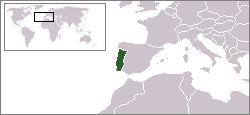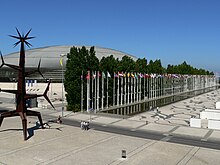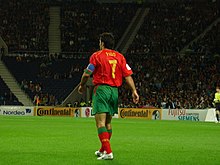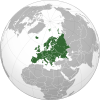Portugal
38°42′N 9°11′W / 38.700°N 9.183°W
Portuguese Republic República Portuguesa | |
|---|---|
| Motto: none | |
| Anthem: A Portuguesa | |
 | |
| Capital | Lisbon (Lisboa) |
| Largest city | Lisbon |
| Official languages | Portuguese1 |
| Government | Parliamentary democracy |
| Aníbal Cavaco Silva | |
| José Sócrates | |
| Formation | |
• Independence | June 24, 1128 |
• Recognized | October 5, 1143 |
• Water (%) | 0.5% |
| Population | |
• July 2006 estimate | 10,605,870 (75th) |
• 2001 census | 10,148,259 |
| GDP (PPP) | 2005 estimate |
• Total | $203.4 billion (41st) |
• Per capita | $19,335 (37th) |
| HDI (2003) | 0.904 very high (27th) |
| Currency | Euro (€)2 (EUR) |
| Time zone | WET3 |
• Summer (DST) | UTC+1 (EST) |
| Calling code | 351 |
| ISO 3166 code | PT |
| Internet TLD | .pt |
1Mirandese and Portuguese Sign Language are officially recognized and protected. 2Prior to 1999: Portuguese escudo 3Azores: UTC-1; UTC in summer | |


Portugal, officially the Portuguese Republic (Portuguese: República Portuguesa; pron. IPA [ʁɛ'puβlikɐ puɾtu'ɣezɐ]) is located in southwestern Europe on the Iberian Peninsula, and is the westernmost country of mainland Europe. Portugal is bordered by Spain to the north and east and by the Atlantic Ocean to the west and south. Two archipelagos in the Atlantic, Azores and Madeira, are also part of Portugal.
Portugal has witnessed a constant flow of different civilizations during the past 3,100 years, including Greek, Roman, Germanic, Moorish and other, who all made an imprint on the country's culture, history, language and ethnic make-up. During the 15th and 16th centuries, Portugal was one of the world's major economic, political, and cultural powers, with the Portuguese Empire stretching from Brazil to the Indies. With the end of the Empire in the 20th Century, Portugal turned to Europe and today is a stable democracy fully integrated in the European Union.
History

Portugal as an independent nation started on October 5 1143, when Alfonso VII, King of León and Castile, recognized the independence of the County of Portugal, with Afonso I as its King. Afonso and his successors, aided by the military monastic Orders, pushed southwards to wrest more land from the Moors, as Portugal started with about half its present area. In 1249 the Portuguese Reconquista ended when it reached the southern coast of the Algarve.
In 1383, the King of Castile claimed the right to the throne of Portugal, as he was married to the daughter of the King of Portugal who had died with no male heir. The ensuing popular revolt led to the 1383-1385 Crisis. A faction of petty noblemen and common folk, led by John of Aviz (later John I), seconded by general Nuno Álvares Pereira, defeated the Castilians on the Battle of Aljubarrota, the most celebrated battle in Portuguese history and still a symbol of the struggle for independence from neighbour Spain.
In 1373 Portugal made an alliance with England, probably the longest in History as it still stands today. In the following decades, Portugal spearheaded the exploration of the world and started the Age of Discovery. Prince Henry the Navigator, son of King John I, took on the role of main sponsor and patron of this endeavour.
In 1415, the Portuguese Empire began when a Portuguese fleet conquered Ceuta, a rich Islamic trade centre in North Africa. There followed the first discoveries in the Atlantic: Madeira and the Azores, which led to the first colonization movements.
Throughout the 15th Century, the Portuguese Explorers sailed down the coast of Africa, establishing trading posts along the way, while they were looking for the route to India, land of the spices, which were very coveted and precious in Europe. In 1498, Vasco da Gama finally arrived in India by sea, and economic prosperity ensued for Portugal, then with a population of one million, one-tenth the present number.

In 1500, Pedro Álvares Cabral landed on Brazil and claimed it for the Portuguese Crown. Ten years later, Afonso de Albuquerque conquered Goa, in India, Ormuz in the Persian Straight, and Malacca in modern day Malaysia. Thus, the Portuguese Empire had the dominion of the commerce in the Indian Ocean and in the South Atlantic.
The independence of Portugal was interrupted from 1580 to 1640. As King Sebastian died in a battle in Morocco leaving no heir, Philip II of Spain claimed the throne and got it, becoming Philip I of Portugal. Although Portugal did not lose its formal indepence as a kingdom, the fact is that it was governed by same king that governed Spain, forming a Union of Kingdoms; but not for long: in 1640, John IV spearheded a rebellious uprising backed by disgruntled Portuguese nobles, and was acclaimed King, starting the long-lasting dynasty of Braganza. By this time, however, the Portuguese Empire was already under severe attack from the ambitions of other countries, namely Britain and the Netherlands, and Portugal entered a slow but inexorable decline until the 20th Century, especially after the independence of Brazil in 1822, entering a period of political chaos and civil wars.
In 1910, a republican revolution deposed the Portuguese monarchy. But the chaos continued and considerable economic problems aggravated by a disastrous military intervention in the First World War led to a military coup d'état in 1926. This led to the establishment of the right-wing dictatorship of António de Oliveira Salazar. In the early 1960s, independence movements in the colonies of Angola, Mozambique and Portuguese Guinea originated the Portuguese Colonial War, weakening the regime. In 1974, a bloodless left-wing military coup led the way for the democratic regime of today. Membership in the European Union was achieved in 1986 and since then Portugal has been engaged in a process of convergence with its EU counterparts.
Government and Politics

Portugal is a democratic republic ruled by the Constitution of 1976.
The four main organs of Portuguese politics are the President of the Republic, the Assembly of the Republic, the Government, and the Courts. The Constitution grants the complete separation between the three powers: Legislative, Executive, and Judicial.
The President of the Republic, elected to a five year term by universal suffrage, has a supervising, non-executive role. The Assembly of the Republic is a unicameral parliament composed of 230 deputies elected by universal suffrage for four year terms.
The Government is headed by the Prime Minister, who chooses his Council of Ministers, made of Ministers and their assistants, the Secretaries of State. The national and regional governments are dominated by two political parties, the Socialist Party and the Social Democratic Party.
The Courts are organized into several categories, including judicial, administrative and fiscal. The Supreme Courts are the courts of last appeal. A nine-member Constitutional Court oversees the constitutionality of legislation.
Foreign Relations and Military
Portugal is a member of NATO since 1949, of the European Union since 1986, and of the Community of Portuguese Language Countries since 1996. There is a friendship alliance and dual citizenship treaty with Brazil. Portugal also has very good relations with the USA, UK, China (due to Macau), as well as the Latin European countries (Spain,Italy,France and Romania) and centuries-old diplomatic ties with Morocco.
Portugal's only international dispute concerns the municipality of Olivenza, which Spain received in 1801 under the Treaty of Badajoz and has since administered, but is claimed back by Portugal since 1815 under the Treaty of Vienna. Nevertheless, diplomatic relations between the two countries within the European Union have not been strained.
The Portuguese Armed Forces are divided into three branches: Army, Navy, and Air Force. In the 20th century, Portugal engaged in two major military interventions: the First Great War and the Colonial war (1961-1974). Portugal has participated in several peacekeeping missions abroad, namely East Timor, Bosnia, Kosovo, Afghanistan, Iraq, and Lebanon. Draft service was abolished in 2003.
Administrative Divisions

Portugal has an administrative structure based on 308 municipalities (Portuguese singular/plural: concelho/concelhos), which are subdivided into more than 4,000 civil parishes (freguesia/freguesias). Municipalities are grouped for administrative purposes into superior units, the most significant being the classification since 1976, into either Mainland Portugal (Portugal Continental) or the autonomous regions of Portugal (Azores and Madeira).
Geography and Climate
Continental Portugal is split in two by its main river, the Tagus (Tejo). Northern landscape is mountainous in the interior areas with plateaus, cut by four breaking lines that allow the development of relevant agricultural areas. The South area between the Tejo and the Algarve (the Alentejo) features mostly rolling plains with a climate somewhat warmer and drier than the cooler and rainier north. The Algarve, separated from the Alentejo by mountains, enjoys a Mediterranean climate comparable with Morocco or Southern Spain.
The islands of the Azores and Madeira are located in the Mid-Atlantic Ridge. Some of these islands have had recent volcanic activity, as recently as 1957. Portugal's highest point is Mount Pico in Pico Island, an ancient volcano, at 2,351 metres (7,713 ft).
Portugal's climate can be classified as Mediterranean. One of the warmest European countries, Yearly temperature averages in Mainland Portugal are 15 °C (55 °F) in the north and 18 °C (64 °F) in the south. Madeira and Azores have a narrower temperature range. Spring and Summer months are sunny, Autumn and Winter are rainy and windy.
Economy

Portugal joined the European Union in 1986 and started a process of modernization in a very stable environment. It achieved a healthy level of growth in terms of modernization. Successive governments have implemented various reforms and privatised many state-controlled firms and liberalised key areas of the economy. Portugal was one of the founding countries of the euro in 1999.
Major industries include oil refineries, cement production, automotive, pulp and paper industry, textile, footwear, furniture, and cork (the world leader productor). Template:InoteAgriculture no longer represents most of the economy but the portuguese wines, namely Port Wine and Madeira Wine are still exported worldwide. Tourism is also an important activity, specially in the Algarve (south) and Madeira Islands regions.
Energy, Transportation and Communications

As of 2006, 55% of Portuguese energy production is made by coal and fuel powerplants. The other 40% is produced by hydroelectrics and 5% by wind energy. The government is trying to invest in alternative types of energy exploring the wind and the sun.
Transportation was seen as a priority in the 1990s, pushed by the growing use of automobiles and industrialization. The country has a 68,732 km (42,708 mi) network of roads, of which 2,000 km (1,240 mi) in 44 motorways.
The two principal metropolitan areas have subway systems: Lisbon Metro and Porto Metro, each with more than 35 kilometres (22 mi) of lines. Construction of a high-speed TGV line connecting Porto and Lisbon, and Lisbon with Madrid will begin in 2008, replacing the current Pendolinos. A new Airport for Lisbon will be built at the same time in Ota.
Portugal has one of the highest mobile phone penetration rates in the world. As of March 2006, 30% of homes had high-speed internet services and 78% of companies had Internet access. Most Portuguese watch television through cable (June 2004: 73.6% of households).
The most important airports are in Lisbon, Faro, Oporto, Funchal (Madeira), and Ponta Delgada (Azores).
Demographics
Portugal is a fairly homogeneous country linguistically and religiously. The Portuguese people are a combination of several ethnicities: pre-Roman Iberian and Celtic tribes with Romans and Germanic tribes.
In the 2001 Census, Portugal had a population of 10,356,117, of which 51.7% female. By the end of 2003, legal immigrants represented 4.2% of the population, and the largest communities were from: Ukraine, Brazil, Cape Verde, and Angola but there were also immigrants from other parts of Latin America and Eastern Europe. The great majority of the Portuguese population is Roman Catholic. The biggest metropolitan areas are Lisbon, Oporto, Braga, Coimbra and Aveiro.
Ethnic Minorities and persons with disabilities
Anti-racism laws prohibit and penalize racial discrimination in housing, business, and health services. Approximately 500,000 legal immigrants live in the country, representing approximately 5 percent of the population. The country also has a resident Roma population of approximately 50,000 people.
Discrimination against persons with disabilities in employment, education, access to health care, or the provision of other state services is illegal. The law mandates access to public buildings and to newly-built private buildings for such persons.
Education

The education system of Portugal is divided into Pre-schooling (children until aged six), Basic Education (nine years in three stages), Secondary Education (three years) and Higher Education (University and Polytechnic). Basic Education is free and compulsory.
Portuguese Universities exist since 1290. They are divided into faculties. The Bologna process is being adopted to become effective before 2011.
Law
The Portuguese legal system is part of the civil law or continental family of legal systems. Up to the end of the 19th century French law was the main influence, but since then the major influence has been German law. The main laws include the Constitution (1976, as amended), the Civil Code (1966, as amended) and the Penal Code (1982, as amended).
Culture

Portugal has developed a specific culture while being influenced by the various civilizations that crossed the Mediterranean and those that were discovered during the Age of Discovery.
Portuguese literature is one of the earliest Western literatures, developed through texts and songs. Until 1350, the Portuguese-Galician troubadours spread their literary influence to most of the Iberian Peninsula Template:Inote. Gil Vicente (c.1465 - c.1536) was one of the founders of both Portuguese and Spanish dramatic traditions. Adventurer and poet Luís de Camões (c.1524 - 1580) wrote the epic poem The Lusiads, with Virgil's Aeneid as main model. Modern Portuguese poetry is essentially rooted in neo-classic and contemporary styles, as execplified by Fernando Pessoa (1888 – 1935). Modern literature became internationally known through the works of, among others, Almeida Garrett, Camilo Castelo Branco, Eça de Queirós, Sophia de Mello Breyner Andresen, António Lobo Antunes, and 1998 Nobel prize winner, José Saramago.
Portuguese music encompasses a wide variety of genres. The most renowned is Fado, a melancholic urban music, usually associated to the Portuguese guitar and to saudade, the feeling of missing someone. Some of its most internationally notable performers are Amália Rodrigues, Mariza, Mísia, and Madredeus. Despite fado and folk, Portuguese youngsters seem to enjoy rock, pop and other modern types of music like hip-hop tuga. The Portuguese organize every year several festivals like Zambujeira do Mar, Paredes de Coura, Rock in Rio Lisboa, MTV Europe Music Awards in 2005 among many others.
Portuguese traditional architecture is distinct due to the variety of influences it features. Modern Portugal has given the world renowned architects Eduardo Souto de Moura and Álvaro Siza Vieira. Prominent international figures in visual arts include painters Vieira da Silva and Paula Rego.
Since the 1990s, Portugal has increased the number of public cultural facitilies, in addition to the Calouste Gulbenkian Foundation established in 1956. These include the Belém Cultural Center in Lisbon, Serralves Foundation and the House of Music, both in Oporto.
Cuisine
Portuguese cuisine is particularly diverse; various recipes of rice, potatoes, bread, meat, sea-food, and fish are the staple foods in the country. The Portuguese have a reputation for loving cod dishes (bacalhau in Portuguese), for which it is said that there are 365 ways (one for each day of the year) of cooking it: Pastéis de Bacalhau, Bacalhau à Brás and Bacalhau à Gomes de Sá are some of the most popular ones. Other fish recipes are popular like the grilled sardines and Caldeirada. The art of pastry, having its origins in old and rich conventual pastry recipes, is very popular across the entire country. Desserts and cakes, such as Lisbon's Pastéis de Nata (best eaten with a strong coffee), Aveiro's Ovos-Moles, and many other, are very appreciated. Portugal has its own adaptation of fast-food; one of the most popular is Porto's Francesinha. Other recipes include the Feijoada, made with pieces of meat, sausages and beans served with white and dry rice, the Cozido à Portuguesa, made with various kinds of meat, rice, potatoes and other vegetables, all boiled, and the Espetadas.
Portuguese wines have been exported since Roman times. The Romans associated Portugal with Bacchus, their god of Winery and Feast. Today the country is known by wine lovers, and its wines have won several international prizes. Many famous Portuguese wines are known as some of the world's best: Vinho Verde, Vinho Alvarinho, Vinho do Douro, Vinho do Alentejo, Vinho do Dão, Vinho da Bairrada and the sweet: Port Wine, Madeira wine and the Moscatels of Setúbal and Favaios (Douro). Porto Wine is widely exported, followed by Vinho Verde. Exports of Vinho Verde are increasing rapidly, in response to the growing international demand.
Sports and games

Football is the most popular and practised sport in Portugal. As of May 2006, the Portuguese national team was ranked 7th out of 205 countries by FIFA. The legendary Eusébio is still a symbol of Portuguese football. Luís Figo was voted 2001 Player of the Year by FIFA, after finishing 2nd in 2000. Rui Costa and Cristiano Ronaldo are also noteworthy and Vítor Baía is the player in history with most titles won, including all European club cups. Moreover, José Mourinho is regarded as one of the most successful and well-paid football managers in football's history. The main domestic football competition is the Superliga where the dominating teams are SL Benfica, FC Porto and Sporting CP. Portugal hosted and nearly won EURO 2004, getting defeated in the final by surprise winner Greece. The Portuguese national team also reached the semi-finals of the FIFA World Cup twice, in 1966, when Eusebio was the top scorer, with 9 goals, in 2006. The year 2006 was the year that Portugal nearly won the FIFA World Cup tournament, ranking 4th overall after being defeated by Italy and Germany's football teams. This was the first time since 1976 that the Potuguese football team had advanced to a such a high qualifying round in a World Cup tournament. The team was welcomed back proudly from its country. Other than football, many other professional and well organized sport competitions take place every season in Portugal, including basketball, swimming, athletics, tennis, gymnastics,futsal, rink hockey, team handball, volleyball, and rugby championships among the hundreds of sports played in this country. Cycling, with Volta a Portugal being the most important race, and athletics competitions are also popular. In rink hockey Portugal is the country with most world titles: 15 World Championships and 20 European Championships, and in rugby sevens the Portuguese team has won many international trophies, having as of July 2006 five European Championship titles. Golf is also worth mentioning, since its greatest players play in the sunny region of the Algarve during the "Algarve Open". The Autódromo Fernanda Pires da Silva in the Estoril, near Lisbon, is the main Portuguese race track where many motorsport competitions are held, including the World Motorcycling Championship and A1 Grand Prix. Rallying (with the Rally of Portugal and Rally Madeira) and off-road (with the Baja Portugal 1000 and recently Lisboa-Dakar) events also have international recognition. Triathlon is also giving important steps thanks to the world cup leader Vanessa Fernandes and martial arts like judo, which has brought many medals to Portugal and box.
The country has an ancient martial art known as "Jogo do Pau" (Portuguese Stick Fencing), used for self-protection and for duels between young men in disputes over young women. Having its origin in the Middle Ages, Jogo do Pau uses wooden staves as a combat weapon. Other sports are the "Jogos Populares", a wide variety of traditional sports played for fun.
Festivals and Holidays
Festivals play a major role in Portugal's summers. Every city and town has its own festivals. The June Festivities are very popular. These festivities are dedicated to three saints known as Santos Populares (popular saints) and take place all over Portugal. Why the populace associated the saints with these pagan festivities is not known. The practice is possibly related to Roman or local deities before Christianity spread into the region. The three saints are Saint Anthony, Saint John and Saint Peter. A common denominator in these festivities are the wine and água-pé (a watered kind of wine), traditional bread along with sardines, marriages, traditional street dances, fire, fireworks and celebration.
Facts and figures
- Official date format: YYY/MM/DD (ex. 2006/09/08)
- Common date format: DD/MM/YYYY (ex. 06/09/2006), dates are written out as DD de MM de YYYY (ex. 1 de Janeiro de 2005)
- Decimal separator is a comma: 123,45
- Thousands are officially separated by a space — 10 000 — although the point is still used — 10.000.
- The currency is the euro, abbreviation €, divided into 100 cêntimos (main article: Linguistic issues concerning the euro#Portuguese).
- The euro sign is commonly placed either before or after the amount, with the separator either a comma or a point: 10,95 € - € 10,95 - € 10.95 - 10.95 €
- Postal code: 4+3 digits, separated by a hyphen (main article: Postal code#Portugal).
See also
Notes and References
- ^ Portuguese has been the official language of Portugal since 1296, replacing Classical Latin, the official language since independence. Portuguese descends from Vulgar Latin. In Portugal, the local Vulgar Latin was known as Vulgar Language before it was renamed Portuguese. Mirandese, a related Romance language, is officially recognized in the municipality of Miranda do Douro, and spoken in the villages of the municipality.
References
- Ribeiro, Ângelo & Saraiva, José Hermano História de Portugal I - A Formação do Território QuidNovi, 2004 (ISBN 989-554-106-6)
- Ribeiro, Ângelo & Saraiva, José Hermano História de Portugal II - A Afirmação do País QuidNovi, 2004 (ISBN 989-554-107-4)
- de Macedo, Newton & Saraiva, José Hermano História de Portugal III - A Epopeia dos Descobrimentos QuidNovi, 2004 (ISBN 989-554-108-2)
- de Macedo, Newton & Saraiva, José Hermano História de Portugal IV - Glória e Declínio do Império QuidNovi, 2004 (ISBN 989-554-109-0)
- Ribeiro, Ângelo & Saraiva, José Hermano História de Portugal V - A Restauração da Indepêndencia QuidNovi, 2004 (ISBN 989-554-110-4)
- Saraiva, José Hermano História de Portugal X - A Terceira República QuidNovi, 2004 (ISBN 989-554-115-5)
- Loução, Paulo Alexandre: Portugal, Terra de Mistérios Ésquilo, 2000 (third edition; ISBN 972-8605-04-8)
- Muñoz, Mauricio Pasto: Viriato, A Luta pela Liberdade Ésquilo, 2003 (third edition; ISBN 972-8605-23-4)
- Grande Enciclopédia Universal Durclub, 2004
- Constituição da República Portuguesa, VI Revisão Constitucional, 2004
- Programa do Movimento das Forças Armadas, 1974[1]
External links
- Official travel and tourism office website
- Official Portuguese Government website
- Official Parliament website
- Wikitravel guide to Portugal




